| Data Structures and Algorithms |
| 6.2 Heaps |
Formally:
A binary tree is completely full if it is of height, h, and has 2h+1-1 nodes.
A binary tree of height, h, is complete iff
A complete tree is filled from the left:
- all the leaves are on
- the same level or
- two adjacent ones and
- all nodes at the lowest level are as far to the left as possible.
Heaps
A binary tree has the heap property iff- it is empty or
- the key in the root is larger than that in either child and both subtrees have the heap property.
The value of the heap structure is that we can both extract the highest priority item and insert a new one in O(logn) time.How do we do this?
| Let's start with this heap.A deletion will remove the T at the root. | 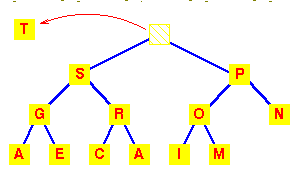 |
| To work out how we're going to maintain the heap property, use the fact that a complete tree is filled from the left. So that the position which must become empty is the one occupied by the M.Put it in the vacant root position. | 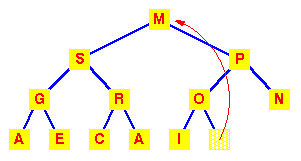 |
| This has violated the condition that the root must be greater than each of its children.So interchange the M with the larger of its children. | 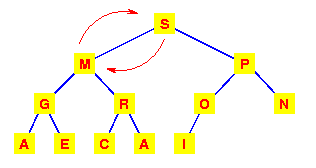 |
| The left subtree has now lost the heap property.So again interchange the M with the larger of its children. | 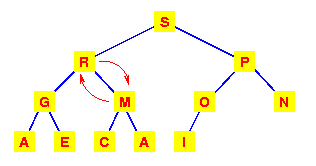 |
We need to make at most h interchanges of a root of a subtree with one of its children to fully restore the heap property. Thus deletion from a heap is O(h) or O(logn).
Addition to a heap
| To add an item to a heap, we follow the reverse procedure.Place it in the next leaf position and move it up. Again, we require O(h) or O(logn) exchanges. | 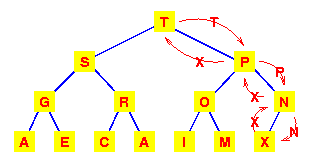 |
Storage of complete trees
The properties of a complete tree lead to a very efficient storage mechanism using n sequential locations in an array.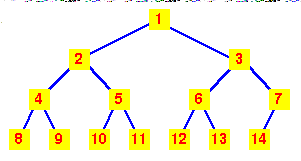 | If we number the nodes from 1 at the root and place:
|
| Viewed as an array, we can see that the nth node is always in index position n. | 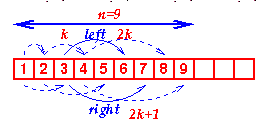 |
The code for extracting the highest priority item from a heap is, naturally, recursive. Once we've extracted the root (highest priority) item and swapped the last item into its place, we simply call MoveDownrecursively until we get to the bottom of the tree.
heap
![heap]() Reviewed by Shobhit Goel
on
November 20, 2015
Rating:
Reviewed by Shobhit Goel
on
November 20, 2015
Rating:




No comments:
Post a Comment